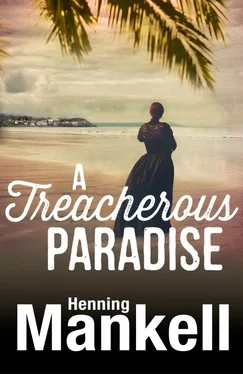‘Who looks after your children when you’re here?’
‘Their mother does.’
Hanna shook her head. She didn’t understand.
‘Their mother? I thought you said you were their mother.’
‘My sister. She’s also their mother. Just as I’m her children’s mother as well. Or my other sisters’ children’s mother.’
‘How many sisters do you have?’
‘Four.’
Hanna thought that over. There was of course another question she felt bound to ask.
‘What does your husband say about you working here?’
‘Nothing,’ said Felicia quite simply. ‘He knows that I’m faithful to him.’
‘Faithful? Here?’
‘I only go with white men. For money. He doesn’t bother about that.’
Hanna tried to understand what she’d just heard. All the time the gap seemed to grow wider rather than narrower. She didn’t comprehend the world she was living in.
She thought about Carlos again. Perhaps he no longer wanted to be an ape, but he couldn’t be a human being.
The lonely chimpanzee had changed into a vacuum inside a white waiter’s coat.
What was she turning into?
That evening Hanna decided to accept Senhor Vaz’s proposal of marriage. The most important reason for her decision was that she had come to accept that she could no longer cope with living as a widow. And perhaps one day she would be able to feel the same for Vaz as she had done for Lundmark.
The following day she gave him her answer. Senhor Vaz didn’t seem to be surprised, but evidently regarded her ‘yes’ as a formality that he had taken for granted.
Three weeks later they were married at a simple ceremony in the Catholic priest’s residence next to the cathedral. The marriage witnesses were people Hanna didn’t know. Senhor Vaz had also taken Carlos along, dressed in his tailcoat, but the priest had refused to allow the chimpanzee to be present. He was quite shocked, and regarded the proposed presence of Carlos to be blasphemy. Senhor Vaz had no choice but to accept the priest’s ban. Carlos waited outside while the ceremony took place, and climbed up into the bell tower. Afterwards they had dinner in the best hotel in town, which was situated on a hill with views over the sea. Carlos was with them, because they had a private room.
They spent their wedding night in a suite in the hotel. There was a smell of lavender when Hanna entered the bedroom.
When they had switched the light off she could feel the warm breath of her new husband on her face. For a short, confused moment it was as if Lundmark had come back to her; but then she smelled the pomade in his black hair and knew that this was a different man lying by her side.
She waited for what was going to come next. She spread herself out, prepared herself. But Senhor Vaz — or Attimilio to use his first name — didn’t manage to penetrate her. He tried over and over again, but he wasn’t up to it: what should have been a lance was a broken twig.
In the end he turned away from her and curled up, as if he were ashamed.
Hanna wondered if she had done something wrong. But the next day, when she plucked up courage and asked Felicia about it, she was told that what had happened was not unusual as far as men were concerned. All in good time Senhor Vaz would no doubt be able to prove that he had the strength on which the whole of his commercial enterprises depended. But the fact was that there was always a threat hanging over a brothel: all men could suddenly become impotent.
Hanna didn’t understand everything that Felicia said, but she did realize that what had happened wasn’t her fault.
A few days later they moved into the stone house that had by now been filled with furniture. There was a handsome, shiny piano in one room that smelled of mimosa and other plants that Hanna had never come across before.
One evening, a few weeks after her wedding, when Hanna was alone with the maid, she played a note on the piano and made it linger on by treading on one of the pedals.
It was as if the room’s shadows were suddenly populated by all those people she had left behind. Jonathan Forsman, Berta, Elin, her siblings and the third mate whose burial at sea she had attended six months earlier.
But her reaction was neither sadness nor regret. A cold wind of dismay blew past her. It came from nowhere as the sound of the piano faded away. What had she done? By attaching herself to a man she barely knew?
She didn’t know. But she forced herself to think: there is no turning back. I am where I am.
Nowhere else but just here.
Every morning she went out on to the balcony that ran along the whole of the house’s upper floor. From there she could see the town climbing up and down the slopes beyond the harbour with its many cranes gleaming in the heat haze, and furthest away the sea where ships were waiting for high tide. She had bought a better pair of binoculars than the ones she had before, and Senhor Vaz had paid a black carpenter to make a stand on which the binoculars could rest.
She continued to keep an eye on the ships, but now she no longer hoped to discover one in the roadstead flying a Swedish flag. On the contrary. Every morning she was scared she might see a ship lying there which could take her home. She was afraid that in that case she would begin to think that the ship had come too late.
Attimilio, as she still found it difficult to call him, left the house every morning at eight o’clock. He clambered into one of the horse-drawn coaches that took him down to the harbour district. At about noon he would come back home and they would eat lunch together, after which he took an afternoon nap before going back down to the women again.
Hanna very soon discovered that her new marriage was very different in one particular way from the time she had spent with Lundmark. Now she was almost always alone. Lundmark had always been close at hand when they were aboard Captain Svartman’s ship. Her new husband treated her with the greatest respect and was always friendly towards her, but he was rarely at home. He ate and slept, and at night he continued to make his failed attempts to do what Hanna now, to her great surprise, had begun to long for. But apart from that they did next to nothing together. She continued to ask him questions about his earlier life, but he answered evasively or not at all. He didn’t lose his temper and didn’t seem to be put out by her questions: but he quite simply didn’t want to say anything. Hanna thought it seemed as if she had married a man without a past at all.
Looking back, Hanna would regard this time as one of almost total inactivity. There was virtually nothing for her to do, no jobs that needed to be done. The garden was looked after by an old black man who was stone deaf. His name was Rumigo, and he had one of his innumerable sons to help him. Hanna would sometimes stand and watch how gently he handled the flowers, trees and shrubs. Inside the house was Anaka, who had also looked after Attimilio’s parents. She was beginning to grow old, but still worked just as hard, and hardly ever seemed to sleep. She lived alone in a little shack behind the house. Hanna sometimes saw her sitting there, smoking her pipe before going to bed. Anaka would be up again at four o’clock, and served breakfast at six.
Whenever Hanna spoke to Anaka, the maid immediately went down on one knee before her. Attimilio had explained to Hanna that this was not primarily a gesture of submission and subservience, but more of a tradition — a way of showing respect. Hanna found it difficult to cope with these continual genuflections, and tried to persuade Anaka to stop it. But without success. When Attimilio explained that Anaka would do the same to a black man of superior rank, she gave up. The genuflections continued.
Читать дальше












